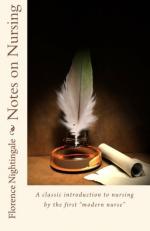In cases of long recurring faintnesses from disease, for instance, especially disease which affects the organs of breathing, fresh air to the lungs, warmth to the surface, and often (as soon as the patient can swallow) hot drink, these are the right remedies and the only ones.
Yet, oftener than not, you see the nurse or mother just reversing this; shutting up every cranny through which fresh air can enter, and leaving the body cold, or perhaps throwing a greater weight of clothes upon it, when already it is generating too little heat.
“Breathing carefully, anxiously, as though respiration were a function which required all the attention for its performance,” is cited as a not unusual state in children, and as one calling for care in all the things enumerated above. That breathing becomes an almost voluntary act, even in grown up patients who are very weak, must often have been remarked.
“Disease having interfered with the perfect accomplishment of the respiratory function, some sudden demand for its complete exercise, issues in the sudden standstill of the whole machinery,” is given as one process:—“life goes out for want of nervous power to keep the vital functions in activity,” is given as another, by which “accidental” death is most often brought to pass in infancy.
Also in middle age, both these processes may be seen ending in death, although generally not suddenly. And I have seen, even in middle age, the “sudden stand-still” here mentioned, and from the same causes.
[Sidenote: Summary.]
To sum up:—the answer to two of the commonest objections urged, one by women themselves, the other by men, against the desirableness of sanitary knowledge for women, plus a caution, comprises the whole argument for the art of nursing.
[Sidenote: Reckless amateur physicking by women. Real knowledge of the laws of health alone can check this.]
(1.) It is often said by men, that it is unwise to teach women anything about these laws of health, because they will take to physicking,—that there is a great deal too much of amateur physicking as it is, which is indeed true. One eminent physician told me that he had known more calomel given, both at a pinch and for a continuance, by mothers, governesses, and nurses, to children than he had ever heard of a physician prescribing in all his experience. Another says, that women’s only idea in medicine is calomel and aperients. This is undeniably too often the case. There is nothing ever seen in any professional practice like the reckless physicking by amateur females.[1] But this is just what the really experienced and observing nurse does not do; she neither physics herself nor others. And to cultivate in things pertaining to health observation and experience in women who are mothers, governesses or nurses, is just the way to do away with amateur physicking, and if the doctors did but know it, to make the nurses obedient to them,—helps to them instead of hindrances. Such education in women would indeed diminish the doctor’s work—but no one really believes that doctors wish that there should be more illness, in order to have more work.




